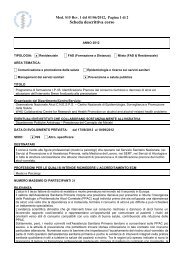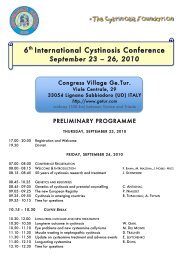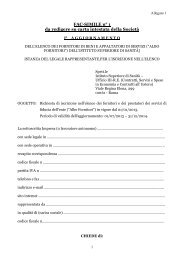Rapporti ISTISAN 09/49 ISTITUTO SUPERIORE DI SANITÀ Ageing ...
Rapporti ISTISAN 09/49 ISTITUTO SUPERIORE DI SANITÀ Ageing ...
Rapporti ISTISAN 09/49 ISTITUTO SUPERIORE DI SANITÀ Ageing ...
Create successful ePaper yourself
Turn your PDF publications into a flip-book with our unique Google optimized e-Paper software.
<strong>Rapporti</strong> <strong>ISTISAN</strong> <strong>09</strong>/<strong>49</strong><br />
seemingly inexplicable. Researchers have tried to explain behaviours such as the little degree of<br />
proportionality between the tendency to resort to doctors and the symptoms of which people<br />
complain. There are people, who, even if they show significant symptoms, tend not to resort to<br />
doctors or not to follow the treatments prescribed to them. On the other side, there are healthy<br />
people who frequently resort to health services even for minor disturbances. These two<br />
behaviours can be even more found within a different way of self-representation and then of<br />
living the ageing stage of our life.<br />
According to the model of mental representation, the answers that people give are regulated<br />
by the implicit theories that they develop about illnesses. Mental representation plays a<br />
fundamental role in the processes of response that people put into practice towards diseases and<br />
it consists of four elements: a) the identity, intended as the word label given to a disease; b) the<br />
cause (the reason why we think to have taken ill); c) the time course, intended as the whole of<br />
expectations about the duration of the illness; d) the consequences, that is the expectations about<br />
the outcome of the illness (Zani & Cicognani, 2000). Later as a further element, the treatment,<br />
that is the whole of actions that a person can carry out for lightening his/her condition or for<br />
recovering his/her state of health (Lau & Hartman, 1983).<br />
Other studies regarding mental representation of diseases are those carried out by Bishop<br />
(Bishop, 1987; Bishop, 1991). The author affirms that people cognitively organise the<br />
information on different illnesses and recall them to their mind, referring to general conceptions<br />
defined prototypes (Rosch, 1978), on the nature of diseases, of their causes and consequences.<br />
The prototypes of diseases available in our memory, are compared with the symptoms<br />
experimented at the moment. Later we choose the prototype which best fits the symptomatic<br />
experience we are living. The comparison between prototype and symptomatic experience does<br />
not require a precise and meticulous adherence, but a suitable correspondence bigger than other<br />
possible prototypes. The choice of a certain prototype has consequences both in the actions and<br />
the behaviours which will be later adopted, and in the recall of information in our memory. In<br />
this regard we have observed that the information which best adapt themselves to the prototype<br />
are better and more accurately remembered (Bishop, 1996). From other researches it has<br />
resulted that the cognitive organization of information by an individual about illnesses<br />
influences the way he relates to ill people, and that shows a different way that today exists to<br />
consider the condition of the elderly in relation to these beliefs. The parameters used for<br />
classifying diseases are their seriousness as regards life expectancy and their contagiousness<br />
(Bishop, 1991). The interesting aspect to be observed is that, regardless of the real<br />
characteristics of a certain disease, the perception of its seriousness and particularly its<br />
contagiousness regulate the responses to that disease and to the people who have got it.<br />
The approach to disease representation is centred on the analysis of information procedures<br />
which people use, thus considering health from an essentially individualistic point of view. On<br />
the other hand, Bishop himself underlines the importance of cultural factors on the definition of<br />
categories and dimensions essential for the organization of information in our memory and for<br />
the decisions which people make about diseases.<br />
1.2. Theory of social representations<br />
The theory of social representations has greatly helped the spread of social psychology of<br />
health. Since the first study by Moscovici (Moscovici, 1961) on the social representation of<br />
psychoanalysis, it has become an essential point of reference for social psychology, particularly<br />
the European one. The theory of social representations is characterised by the analysis of the<br />
distinction between individual and social factors. This theory highlights the social and collective<br />
6













![Emilia Romagna [PDF - 175.10 kbytes]](https://img.yumpu.com/23556597/1/184x260/emilia-romagna-pdf-17510-kbytes.jpg?quality=85)



![Istisan Congressi N. 66 (Pag. 1 - 81). [PDF - 2021.12 kbytes] - Istituto ...](https://img.yumpu.com/23556493/1/171x260/istisan-congressi-n-66-pag-1-81-pdf-202112-kbytes-istituto-.jpg?quality=85)